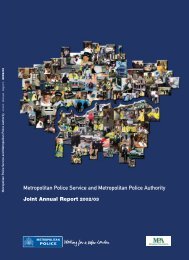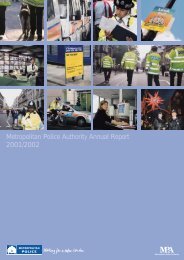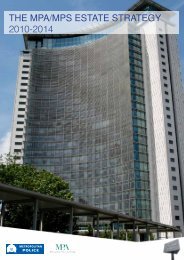Final Report of the Morris Inquiry: The Case for Change
Final Report of the Morris Inquiry: The Case for Change
Final Report of the Morris Inquiry: The Case for Change
Create successful ePaper yourself
Turn your PDF publications into a flip-book with our unique Google optimized e-Paper software.
THE CASE FOR CHANGE<br />
9.77 <strong>The</strong> problem was recognised in <strong>the</strong> Virdi <strong>Inquiry</strong> <strong>Report</strong>:<br />
“Police <strong>of</strong>ficers, it was agreed, are not appropriately skilled or trained in personnel matters.<br />
<strong>The</strong>ir training simply does not provide <strong>the</strong>m with <strong>the</strong> pr<strong>of</strong>essional ‘capital’ and competence to<br />
adequately deal with many <strong>of</strong> <strong>the</strong> critical internal human resources problems <strong>the</strong>y face.”<br />
9.78 It seems likely that <strong>the</strong> same issue applies to police staff and <strong>the</strong> problem is<br />
not unique to <strong>the</strong> MPS. To quote Sir Michael Lyons:<br />
“… you find it in any area <strong>of</strong> public service, and probably we look to lots <strong>of</strong> areas <strong>of</strong> <strong>the</strong><br />
private sector as well, where people come out <strong>of</strong> a pr<strong>of</strong>essional area where <strong>the</strong>y are prized<br />
<strong>for</strong> <strong>the</strong>ir individual contribution in this work and <strong>the</strong>n you say,‘you have done so well <strong>the</strong>re, we<br />
now want you to manage o<strong>the</strong>r people to do that job’, as if somehow those skills have been<br />
developed and <strong>the</strong>re is absolutely no reason to believe <strong>the</strong>y would have been.”<br />
9.79 We have been told by a number <strong>of</strong> witnesses that <strong>the</strong> solution is more<br />
management training <strong>for</strong> <strong>of</strong>ficers and staff. By way <strong>of</strong> example, <strong>the</strong> Metropolitan<br />
Police Federation’s submission called <strong>for</strong> “<strong>the</strong> situation where all members <strong>of</strong> staff<br />
regardless <strong>of</strong> rank or grade receive proper and adequate training be<strong>for</strong>e <strong>the</strong>y are required, or<br />
allowed to undertake any personnel role.”<br />
9.80 AC Hogan-Howe told us that <strong>the</strong> MPS attaches considerable importance to<br />
management training, and was proposing to dedicate 4% <strong>of</strong> all proposed training<br />
days in 2004/2005 to management training, as compared with 1% in 2003/2004.<br />
He also told us that a “diverse range <strong>of</strong> management training is provided locally, covering<br />
specific topics such as attendance management, PDR training and supervisors training.”<br />
9.81 We see <strong>for</strong>mal training as part <strong>of</strong> <strong>the</strong> solution and recognise that it can be useful<br />
<strong>for</strong> some individuals and in relation to some issues such as <strong>the</strong> detail <strong>of</strong> personnel<br />
procedures and how to implement <strong>the</strong>m. However, we endorse Sir Michael Lyons’<br />
preference <strong>for</strong> “development ra<strong>the</strong>r than training” and, like him, we are “sceptical about<br />
<strong>the</strong> extent to which <strong>of</strong>f-<strong>the</strong>-job training can play more than a small part in this process.”<br />
9.82 If <strong>the</strong> MPS is to enhance <strong>the</strong> skills <strong>of</strong> its managers, people issues need to be at<br />
<strong>the</strong> top <strong>of</strong> <strong>the</strong> agenda <strong>of</strong> every manager in <strong>the</strong> MPS and “People have to understand<br />
that development actually affects what <strong>the</strong>y are doing.” (Evidence <strong>of</strong> Sir Michael Lyons.)<br />
9.83 In short, we agree with Nigel Whittaker’s comment that “training <strong>for</strong> training’s<br />
sake is a huge waste <strong>of</strong> money; people go to <strong>the</strong> training and <strong>the</strong>n <strong>the</strong>y <strong>for</strong>get it afterwards.<br />
It has to be reflected and embedded in what <strong>the</strong> organisation is about.”<br />
9.84 <strong>The</strong> best way to achieve this, we think, is <strong>for</strong> <strong>the</strong> MPS to develop a culture where<br />
development and training is not seen as something that is ‘done to’ <strong>the</strong> individual<br />
but ra<strong>the</strong>r something <strong>for</strong> which each <strong>of</strong>ficer and member <strong>of</strong> staff, whe<strong>the</strong>r manager<br />
or managed, has a responsibility. To quote Sir Michael Lyons again “this essentially is<br />
about commitment to make <strong>the</strong> journey. Partly you have to identify that this is a person<br />
capable <strong>of</strong> doing it, but also that <strong>the</strong>y want to make <strong>the</strong> journey <strong>of</strong> self development.”<br />
218


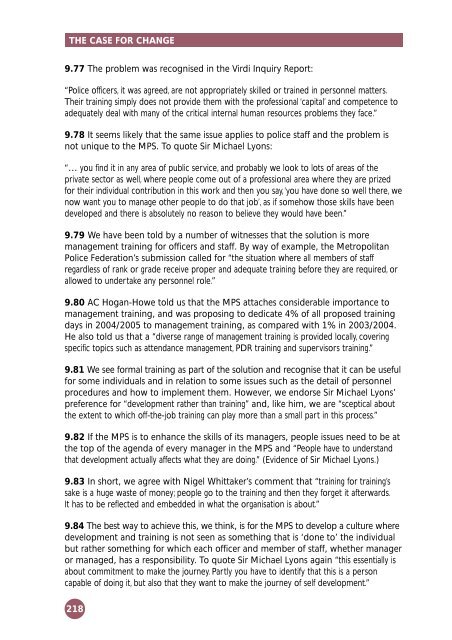
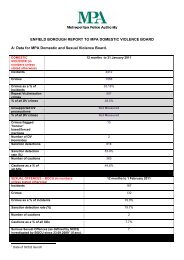

![Appendix 1 [PDF]](https://img.yumpu.com/51078997/1/184x260/appendix-1-pdf.jpg?quality=85)

![Transcript of this meeting [PDF]](https://img.yumpu.com/50087310/1/184x260/transcript-of-this-meeting-pdf.jpg?quality=85)
![Street drinking in Hounslow [PDF]](https://img.yumpu.com/49411456/1/184x260/street-drinking-in-hounslow-pdf.jpg?quality=85)

